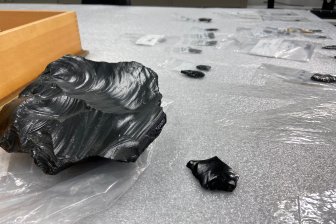Warning: This story deals with disturbing subject matter that may upset and trigger some readers. Discretion is advised.

Rita Okimawinninew went to three residential schools and one day school. She was taken from her home at five years of age and returned when she was 16.
She was gone for 11 years. Okimawinninew is a survivor.
She’s also the mother of filmmaker and PhD-holder Jules Koostachin whose new film WaaPaKe (Tomorrow) follows the generation raised by residential school survivors.
Those raised by survivors are often known as intergenerational survivors and have to deal with trauma that is passed down to them.
For many Indigenous people, residential school trauma is embedded into the very fabric of their communities. Intergenerational trauma continues to undermine the well-being of Indigenous people through systemic impacts and injustices handed out by colonization.
Koostachin’s film explores the experiences of intergenerational survivors and is inspired by her brother, who passed away several years ago. Koostachin made the film to honour his journey and their family’s strength.
“I felt like it was inspired by his story,” she said. “I know that I talk about blaming residential school for his death, but I think there’s a lot of hardship and challenge that we’re still dealing with in our family units that I do believe are indirectly or sometimes directly caused by the residential school system in terms of how we were raised.
“With this particular film, I’m always worried because in a way I’m speaking to my own experience being raised by survivor, but maybe we’re not there yet.”
For Koostachin the film was a necessity, “I understand the weight, I understand the pain, I understand being the child of a survivor,” she said.
“My circumstance is probably very similar to others, but it’s just hard to kind of speak your truth when they’re still around.”
The film hears the stories of residential school survivors and their families with the aim of helping viewers understand the impacts of intergenerational trauma while also examining healing.
Set in a studio in front of a green screen, five people who have all dealt with the intergenerational impacts of residential schools take turns in front of the camera, sharing their experiences.
Interviewed by Koostachin — who also takes a turn in front of the camera — the stories are unique in detailing how each person has navigated the life that’s been handed to them.
“I’m still just trying to figure it out myself,” she said. “So I thought having this variety of voices really helps move the conversation forward.”

For Koostachin it was important that the filmmaking process be collaborative; every decision and shot was thoroughly discussed.
Building blocks were selected to display the names of each interviewee to serve as a reminder that it was children dealing with the abuse. Each person got to select items and medicines that would appear next to them on set during their interview.
And while lots of thought was put into the film, Koostachin isn’t too sure how it will be received. “I think the film is starting the conversation, or scratching the surface for other filmmakers or academics or storytellers or artists to carry on the conversation at their own pace,” she said.
“For me personally, it’s really hard. I don’t want to hurt my mom but then on the other hand, I’m thinking, what about my truth? I feel like I’ve carried this for so long, and it’s like — do I just do this privately through counseling or do I just put it out there?”
WaaPaKe was produced by Teri Snelgrove, distributed by the National Film Board and will have its world premiere at VIFF on Oct. 1 and 4.
The Indian Residential Schools Crisis Line (1-800-721-0066) is available 24 hours a day for anyone experiencing pain or distress as a result of their residential school experience.
- Disturbing evidence admitted in voir dire hearing for B.C. man accused of killing wife
- B.C. secures 8 new middle-income housing sites for BC Builds program
- Vancouver Island teams pairing cops with mental health nurses off to encouraging start
- ‘I came for hard work and I found it’: Bootcamp underway for BC Wildfire Service recruits





Comments